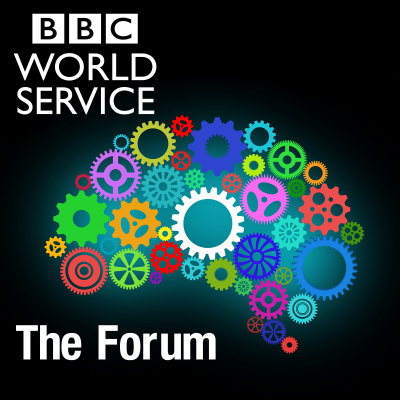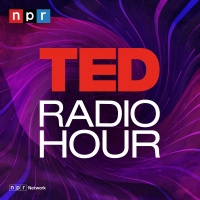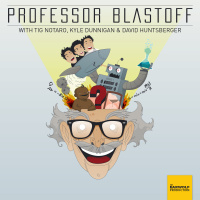Sinopse
A world of ideas
Episódios
-
Joan of Arc: Making a martyr
11/06/2020 Duração: 39minBorn more than six hundred years ago, Joan of Arc is regarded as a French national heroine – a peasant girl who, inspired by saintly visions, battled to break the Siege of Orléans and see Charles VII finally crowned King of France in a grand cathedral. But in 1431, she was burned at the stake.Bridget Kendall and guests discuss the life and death of this medieval teenage celebrity who helped to shape the course of the Hundred Years War with England. They also reflect on her status as an enduring symbol in popular culture through the ages, including on the stage and the big screen. Bridget is joined by film scholar Robin Blaetz, and historians Juliet Barker, Xavier Helary and Daniel Hobbins.Photo: Joan of Arc: Painting by J D Ingres in the Louvre. (Hulton Archive/Getty Images)
-
Babylon, city of wonders
04/06/2020 Duração: 39minWith its Hanging Gardens and huge walls, Babylon was celebrated as one of the Seven Wonders of the ancient world; to the Israelites enslaved there under Nebuchadnezzar, it was a lasting emblem of oppression and depravity, where they wept as they remembered Zion. It is only in the last two hundred years that Babylon's fuller history has been unearthed, both the remains of its buildings and a huge number of clay tablets covered in writing, revealing a complex world that created epic stories, powerful people and an understanding of science and the stars, and it was their 60 based numbering system that led to our 60 seconds in a minute and 60 minutes in an hour. It has been called a cradle of civilisation.Bridget Kendall explores the reputation of Babylon and its contribution to the world with four experts: Frances Reynolds, Shillito Fellow in Assyriology at the Oriental Institute, University of Oxford; Grant Frame, Professor of Assyriology at the University of Pennsylvania and Curator of the Babylonian Section o
-
Aesop and the Fables
28/05/2020 Duração: 39minAesop, with his tales of tortoises and hares, foxes and grapes, and wolves in sheep's clothing has been a part of world literature for over two thousand years. Since the time of the Ancient Greeks successive generations have drawn moral lessons from his fables, and over history his animals' exploits have been used to support differing ideals. Malcolm X was a fan, as was Imperial Britain, the Nazis had their version and the Trade Union movement published the fables too. There are over 700 fables, and they are supposedly written by a black slave far clever than his philosopher master. Bridget Kendall traces the origin and meaning of Aesop's fables and explores what they can teach us about understanding our own extraordinary times with three world experts: Edith Hall, Professor of Classics at Kings College London; Vayos Liapis, Professor of Theatre at the Open University of Cyprus; Dan-el Padilla Peralta, Associate Professor of Classics at Princeton University. (Image: The fox telling Aesop about animals, deco
-
Goethe: The story of colour
21/05/2020 Duração: 39minThe German polymath Johann Wolfgang von Goethe considered his monumental book known in English as The Theory of Colours to be his greatest achievement. The book is a record of hundreds of Goethe’s observations about the way colour affects our mood, as well as a long and heated polemic with Isaac Newton’s colour theory. Goethe’s understanding of light and colour was scientifically flawed yet his book had a surprisingly strong influence on the fine and applied arts. To find out why, Bridget Kendall talks to art historian Alexandra Loske, colour writer Victoria Finlay and designer Odette Steele. Alexandra Loske is an art historian who teaches at the University of Sussex, Curator at the Royal Pavilion and Brighton Museums and co-editor of the book Languages of Colour; Victoria Finlay is a writer, former arts editor of the South China Morning Post and the author of Colour, Travels through the Paintbox and The Brilliant History of Color in Art; Odette Steele is a Zambian textile designer recent and a graduate from
-
The California Gold Rush
14/05/2020 Duração: 39minFrom 1849, hundreds of thousands of prospectors from across the USA headed for California in the hope of finding gold. Some made great fortunes, and there was a new Californian dream for these 49ers, willing to risk everything and, if they failed, to try again. California was to become the engine house of the US economy, while expanding so rapidly that it unbalanced the free and slave-owning states and hastened the USA towards civil war. Yet the new arrivals also drove out competing miners from around the Pacific who had reached the goldfields first, and destroyed the lives of Native Americans there, and excluded Chinese people who had begun to settle, with lasting consequences.Joining Bridget Kendall to explore who won and who lost in the California Gold Rush are Cliff Trafzer, Distinguished Professor of History at the University of California, Riverside; Mae Ngai, Professor of History at Columbia University, and author of the forthcoming book The Chinese Question, a study of Chinese gold miners; and HW Bran
-
The 1918 Spanish Flu: The mother of all pandemics
30/04/2020 Duração: 39minA century ago a deadly flu virus swept the planet, uniting the world in a disaster on a par with World War One.Over 50 million people died. Social distancing was put in place but drugs were ineffective, there was no vaccine, and in many places medicine could not cope. The world recovered but was never the same again. What can the last great pandemic teach us about how to combat Covid-19 today? Three world experts join Bridget Kendall: Laura Spinney, science journalist and author of Pale Rider: The Spanish Flu of 1918 and How it Changed the World;. Svenn Erik Mamelund, historical demographer and research professor at Oslo Metropolitan University; Siddharth Chandra, director of the Asian Studies Centre and professor at James Madison College, Michigan State University.(Photo: Japanese school girls wear protective masks to guard against the influenza outbreak. Credit: Bettmann/Getty Images)
-
Gerard Mercator: The man who revolutionised mapmaking
23/04/2020 Duração: 39minIt’s the map of the world we all recognise today, but until Gerard Mercator came up with his elegant solution in 1569, the question of how to turn the earth’s three dimensional sphere into a flat image had long flummoxed mapmakers. Nearly 500 years later, Mercator’s model is still the standard for modern mapmaking. What makes it so enduring?Joining Rajan Datar to discuss the man who defined the way we see the world are geographer and explorer Nicholas Crane, philosopher Emily Thomas and professor of cartography Philippe De Maeyer.Illustration: Portrait of Gerard Mercator, Flemish cartographer (born Gerard de Kremer, 1512 - 1594). Image credit: Stock Montage/Getty Images
-
Gretta Cousins: champion of Irish and Indian women
16/04/2020 Duração: 39minHow many people can lay claim to playing a key role in three different 20th century protest movements across the world, each of which largely succeeded in their aims? Margaret ‘Gretta’ Cousins, the daughter of a minor court official from Boyle in Ireland and a musician by profession certainly can. The common thread in all of these battles for this driven, feisty activist was the demand for equality for women: Gretta Cousins spent time in jails in Ireland, England and India for her beliefs and remained a catalyst for change throughout her life. As a suffragette she was involved in high-profile direct action in London and Dublin, while in India she not only contributed to the improvement of women’s lives but also became the country’s first female magistrate.Rajan Datar is joined by historians Dr. Margaret Ward from Queen's University in Belfast, Dr. Jyoti Atwal from Jawaharlal Nehru University, New Delhi and University of Limerick and Dr. Emily Rook-Koepsel from the University of Pittsburgh.(Photo: Margaret C
-
Natsume Soseki: Japan’s great novelist
09/04/2020 Duração: 39minNatsume Soseki is one of the greatest writers in the history of Japan. The backdrop to his work is the disorientation and social anxiety of the early 20th Century as Japan undertook rapid modernization after centuries of being closed to the world. Soseki has had a huge influence on generations of Japanese authors and has obsessed some international artists. His work is taught to generations of school children in Japan and greatly admired by scholars but remains obscure to much of the rest of the world. Why? Joining Bridget Kendall to discuss the life and work of Japanese writer Natsume Soseki: The author and critic Damian Flanagan; Michael Bourdaghs, Professor of East Asian Languages at the University of Chicago; and Reiko Abe Auestad, Professor of Culture Studies and Oriental Languages at the University of Oslo.(Photo: Natsume Soseki on a 1000 Yen note, series D. Credit: A Dagli Orti/DEA/Getty Images)
-
In search of the good life: Epicurus and his philosophy
02/04/2020 Duração: 39minThe popular view of an Epicurean is that of somebody who focuses on pleasure as our guiding principle, indulging in the finer things of life to achieve happiness. And yet what the Ancient Greek philosopher Epicurus understood by pleasure was far more nuanced. In fact, Epicurus and his followers advocated a simple lifestyle, withdrawn from society, where we are content with little. What is perhaps less known is how Epicurean writings on physics foreshadowed some of the most significant developments in early modern science – including Darwin’s theory of evolution and even Heisenberg’s uncertainty principle. Joining Bridget Kendall is Catherine Wilson, visiting Professor at the Graduate Centre of the City University of New York, and the author of various works on Epicureanism, including How to Be an Epicurean: The Ancient Art of Living Well; Dr Sonya Wurster, Honorary Fellow at La Trobe University in Australia who’s working on a book about the Epicurean philosopher Philodemus; and philosopher and historian Dav
-
Artemisia Gentileschi: The painter who took on the men
26/03/2020 Duração: 39minOne of the most celebrated female painters of the 17th century, Artemisia Gentileschi was the first woman to become a member of the Academy of the Arts of Drawing in Florence. Through her talent and determination - and despite massive obstacles - she forged a 40-year career, and was collected by the likes of Charles I of England and Philip IV of Spain. But after her death, it wasn’t until the 20th century that people began to reinterpret her work in the light of her remarkable life story, including the well-documented fact that she was raped at the age of 17 by fellow painter, Agostino Tassi.Joining Bridget Kendall to discuss the life and work of Italian Baroque artist, Artemisia Gentileschi are four experts: Letizia Treves is curator of the 2020 Artemisia exhibition at London’s National Gallery; Mary Garrard is Professor Emerita of Art History at American University in Washington DC; Jesse Locker is Assistant Professor of Italian Renaissance & Baroque Art at Portland State University; and Patrizia Cavazz
-
Guide dogs for the blind: A history
19/03/2020 Duração: 39minWe are now familiar with dogs helping people with sight loss but where did the idea come from? And how have the ways of selecting, training and using guide dogs changed over time? Bridget Kendall explores the history of guide dogs with Pieter van Niekerk, Head of Public Relations for the South African Guide-Dogs Association and with Karin Floesser, one of the guide dog leaders of the German Federation for the Blind and Partially Sighted. Bridget is also joined by journalist and educator Miriam Ascarelli, biographer of Dorothy Harrison Eustis, the philanthropist who in the 1920s co-founded the American Seeing Eye school, and she hears from Michael Hingson, a blind survivor of the 9/11 attacks.(Image: A guide dog in Shanghai, China. Credit: Wang He/Getty Images)
-
Oscar Niemeyer: Brazil's king of curves
12/03/2020 Duração: 40minBest known for his curvaceous buildings and his design of Brasilia, Oscar Niemeyer was one of Brazil’s greatest architects and a leading pioneer of modernism. During his seven- decade career, Niemeyer designed hundreds of remarkable buildings not just in his native Brazil but also in Europe and as far afield as Algeria. His experimentation with reinforced concrete produced organic curved shapes that were a significant departure from the austere style of European modernism. An ardent communist, Niemeyer hoped his beautiful buildings would be for all sections of society to enjoy, but how does his vision and influence endure today, and are his striking creations still functional and sustainable?Joining Rajan Datar to discuss Oscar Niemeyer and his work are Professor Richard Williams from the University of Edinburgh and the author of “Brazil: Modern Architectures in History”; the Brazilian architect and lecturer at the University of Bath, Dr Juliana Calabria Holley, and Maria Paz Gutierrez, Associate Professor o
-
Haile Selassie: the last emperor of Ethiopia
05/03/2020 Duração: 39minEmperor Haile Selassie was the last in the line of Ethiopia’s ancient monarchy. During his long rule he was revered as an international statesman and reformer, demonised as a dictator, and even worshipped as a God incarnate by the Rastafarians of Jamaica. He was without doubt a controversial figure, but achieved a status in the global arena previously unheard of for an African ruler.Bridget Kendall discusses Haile Selassie’s life and legacy with Prince Asfa-Wossen Asserate, political analyst and author of ‘King of Kings: The Triumph and Tragedy of Emperor Haile Selassie I of Ethiopia’, who is also the great-nephew of Haile Selassie; Gerard Prunier, Independent Consultant on Eastern and Central African affairs, and former Director of the French Centre for Ethiopian Studies in Addis -Ababa; and Laura Hammond, an anthropologist specialising in Ethiopia at the School of Oriental and African Studies, University of London.Image: Haile Selassie Credit: Henry Guttmann/Getty Images
-
Emilie du Chatelet: a free-spirited physicist
27/02/2020 Duração: 39minEmilie du Chatelet was esteemed in 18th-century France as a brilliant physicist, mathematician, thinker and linguist whose pioneering ideas and formidable translations were known all across Europe. And yet, after her death in childbirth in her mid-40s she was nearly forgotten, and if she was remembered at all, then as a companion and collaborator of the famous writer Voltaire. Du Chatelet’s insights into kinetic energy foreshadowed Einstein’s famous equation and her suggestions for experiments with the different colours of light would only be carried out half-a-century after she’d written about them. Plus she was a remarkable personality, determined to live a life of an independent woman, often pushing the boundaries of what was acceptable even in the liberal social circles of her day.Bridget Kendall discusses du Chatelet’s life and work with history professor Judith Zinsser, Chatelet’s biographer David Bodanis and philosophy professor Ruth Hagengruber.Painting: Gabrielle Emilie de Breteuil (1706 -1749), mar
-
Man v mosquito
20/02/2020 Duração: 39minMosquitos are a fast-adapting, elusive enemy which humans have been trying to combat for thousands of years. As vectors of dangerous diseases, these tiny insects have killed more people in human history than any other animal. So what impact has the mosquito had on our lives? How have humans tried to halt its spread? And who is winning the battle?Joining Bridget Kendall to discuss the history of man and the mosquito are Dr. Erica McAlister, Senior Curator of Diptera - Flies - at the Natural History Museum in London; Dr. Timothy Winegard, historian and author of The Mosquito: A Human History of our Deadliest Predator; and Dr. Clifford Mutero of the International Centre for Insect Physiology and Ecology (ICIPE) in Nairobi, Kenya, and author of Mosquito Hunter: Chronicles of an African Insect Scientist.Image: Health workers tackling the spread of the Zika virus in Brazil, 2016 Credit: Mario Tama / Getty Images
-
The magic of bronze
13/02/2020 Duração: 39minFrom Cellini's magnificent Perseus statue to the humblest of tools, people have been using bronze for at least five thousand years. So what makes bronze such a versatile material, how did we first discover it and why have so many precious bronze art works failed to survive? Bridget Kendall is joined by Carol Mattusch, Professor Emerita of Art History at George Mason University; Professor Jianjun Mei, from the University of Science and Technology, Beijing and Director of the Needham Institute in Cambridge who specialises in ancient metallurgy; and David Ekserdjian, Professor of Art and Film History at Leicester University. Also in the programme: Dutch sound artist Floris van Manen follows the key stages of making a bronze bell at Eijsbouts, one of Europe's leading foundries. Photo: Cellini's statue of Perseus holding the head of Medusa (Getty Images)
-
Li Bai: The revered Chinese poet
06/02/2020 Duração: 41minA nomadic wanderer and free-spirited romantic, Li Bai 李白, also known as Li Po, lived some 1300 years ago and yet his poems are still cherished for their wild imagination and effortless artistry. There are many colourful stories about his life but how much can we really know about someone who not only lived so long ago but was also very good at projecting an image of himself as a rebel? And how much of Li Bai's intricate, allusion-rich poetry can be translated successfully into other languages? These are some of the issues that Bridget Kendall discusses with Li Bai scholars Paula Varsano and Wilt Idema, and writer and Li Bai biographer Ha Jin.(Picture: Li Bai sitting on a tree branch. Detail of the decoration on a large ceramic plate from China, 17th-18th century. Credit: DeAgostini/Getty Images)
-
Nefertiti: The beguiling Egyptian Queen
30/01/2020 Duração: 38minA mysterious Egyptian Queen who lived more than 3,000 years ago, Nefertiti still dazzles the modern imagination. Once the wife of a Pharaoh, she might have faded into obscurity, but for the 1912 discovery of an extraordinary bust of her wearing a distinctive flat-topped crown, which captured her very modern beauty and made her into a global celebrity.Joining Bridget Kendall to discuss the story of Queen Nefertiti are Tarek Tawfik, Associate Professor of Egyptology at Cairo University and former Director General of the Grand Egyptian Museum Project; Christian Loeben, curator of the Egyptian and Islamic Collections at the Museum August Kestner in Hannover, Germany; And Joyce Tyldesley, Reader in Egyptology at the University of Manchester, and author of Nefertiti’s Face: The Creation of an Icon.Produced by Jo Impey for BBC World Service(Image Credit: Oliver Lang / DDP / AFP / Getty Images)
-
The amazing Dr Darwin
23/01/2020 Duração: 39minErasmus Darwin was a man of many talents; not only was he a successful physician, a popular poet, an ardent abolitionist and a pioneering botanist, he also worked out how organisms evolve, some 70 years before his grandson Charles’s theories about this revolutionised science. He is credited with many inventions and discoveries including the steering mechanism used in modern cars, the gas laws of clouds and a document copying machine. And he knew how to live life to the full; he fathered at least 14 children and his love of food meant that his dining table had to have a chunk sawn out of it to accommodate his considerable waistline.Joining Rajan Datar to explore the life and work of this remarkable man are Dr Patricia Fara, Emeritus Fellow of Clare College, Cambridge, and biographer of Erasmus Darwin; Dr Malcolm Dick, director of the Centre for West Midlands History at the University of Birmingham; and Maurizio Valsania, professor at the University of Turin in Italy who specialises in 18th Century intellectual









